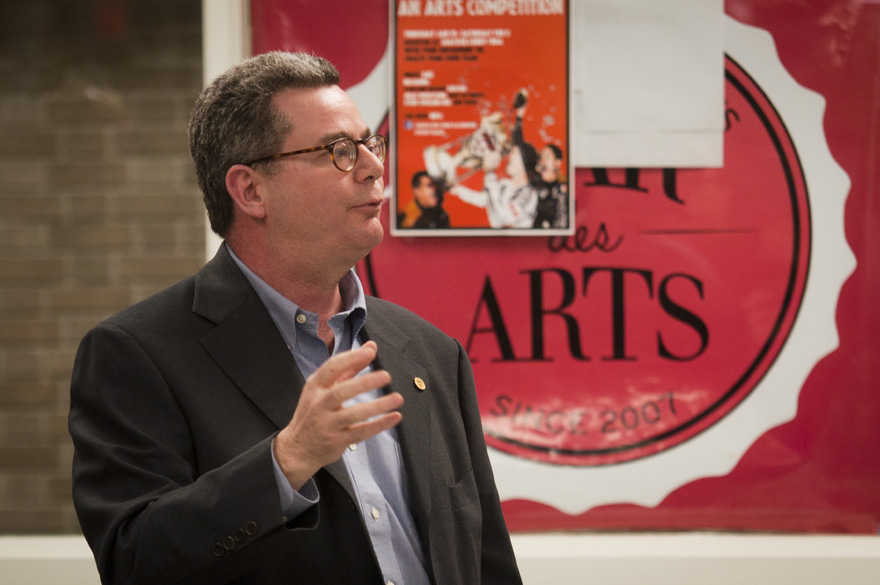Last Tuesday, Dean of Arts Christopher Manfredi listened to students’ concerns about cuts to arts courses, during a Town Hall hosted by the Arts Undergraduate Society (AUS). AUS Vice-President Academic Tom Zheng invited Manfredi to speak about the faculty’s decision to cut up to 100 courses and reduce the number of temporary lecturers teaching in the faculty for the 2013-2014 academic year.
Manfredi said he would pass students’ concerns along to department chairs during the next step in the process, where individual departments will decide which courses they can cut without affecting students’ ability to complete their programs. He announced the reductions to professors and students at a faculty meeting on Jan. 15.
According to Manfredi, the restructuring is intended to increase the proportion of courses taught by permanent teaching staff, and to get rid of classes that are typically under-enrolled. With the remaining funds, the faculty intends to hire more teaching assistants (TAs). The goal is to hire one TA for every 60 students, rather than the current ratio—one TA per 80 students.
Some students, however, expressed frustration at the implication that full-time faculty members provide a better educational experience than part-time lecturers.
“A lot of course lecturers are better at teaching courses than fulltime professors,” Arts Senator James Gutman said. “I know a lot of full-time professors who are great at research but aren’t so good at talking to a crowd of 200 people. Course lecturers are great at that, so why, I ask, are we cutting them?”
Manfredi said consultation on the subject took place with teachers and students in 2008, and a dean’s working group on academic program delivery was held in 2010-2011. He expressed surprise at recent student criticism of the decision, saying that he had already discussed the upcoming course reductions at faculty meetings in September and November, although he and the AUS were unable to plan a Town Hall until last week due to exams.
“There’s nothing secret about it,” Manfredi said. “We did these consultations, and we learned that students were dissatisfied with the level of teaching assistant support, [and that] students were concerned that there was a disconnect between research and teaching in the faculty.”
Although the cuts will target courses with fewer than 20 students, Manfredi emphasized that the intention is to cut courses that are under-enrolled, and not simply small.
“If a course is small by necessity … [or] because pedagogically it has to be small, no problem,” he said. “However, some courses are small by design because the professor doesn’t want to teach more students … and some courses are small because their topics are so esoteric and uninteresting to students that they don’t enroll in those courses.”
Associate Dean of Arts Gillian Lane-Mercier, who also attended and spoke at the Town Hall, emphasized that relatively few courses will be “retired.” Options include offering courses every two or three years, and creating new courses that combine the topics of several smaller courses.
Manfredi said funds from courses that are no longer offered would be reallocated towards teaching assistantships, internships, and advising. However, some students expressed skepticism that the additional funds created by reducing courses will lead to an improved learning experience.
“We’ve been told to get less with a very whispering promise of ‘more,’ ” Gutman said. “What we do know is that course lecturers [and] small courses are going to be cut.”
Manfredi responded to the claim that students may not see “more.” He estimated that the faculty will be able to reallocate $500,000 towards teaching assistantships and $200,000 towards advising and internships.
Students also questioned TAs’ ability to compensate for smaller classes taught by temporary instructors.
“I’ve heard from TAs that they feel ill-equipped when they go into conferences because they’ve never facilitated conversations before or they’ve never really learned how to teach,” Talitha Calder, president of the Political Science Students’ Association, said. “If there are more resources that are being put into the number of TAs … will they also receive the adequate training that is needed to fulfil that position?”
Manfredi encouraged students like Calder to submit their general feedback about the quality of teaching at McGill by completing course evaluations, and by reaching out to the undergraduate representatives of their department.
“We don’t want to offer a low quality educational experience,” Manfredi said. “We’re trying to deliver the best programs we can deliver with the resources we have, and none of us benefit from doing that poorly.”
Zheng said the AUS is committed to preserving the diversity of courses offered by the faculty of arts, and will try their best to ensure that student consultation continues to be part of the process.
“There were a lot of questions that were answered [at the Town Hall] … and there was some good rationale on his side of the story,” Zheng said. “But the changes are going to occur, and people still aren’t going to be happy about it.”









